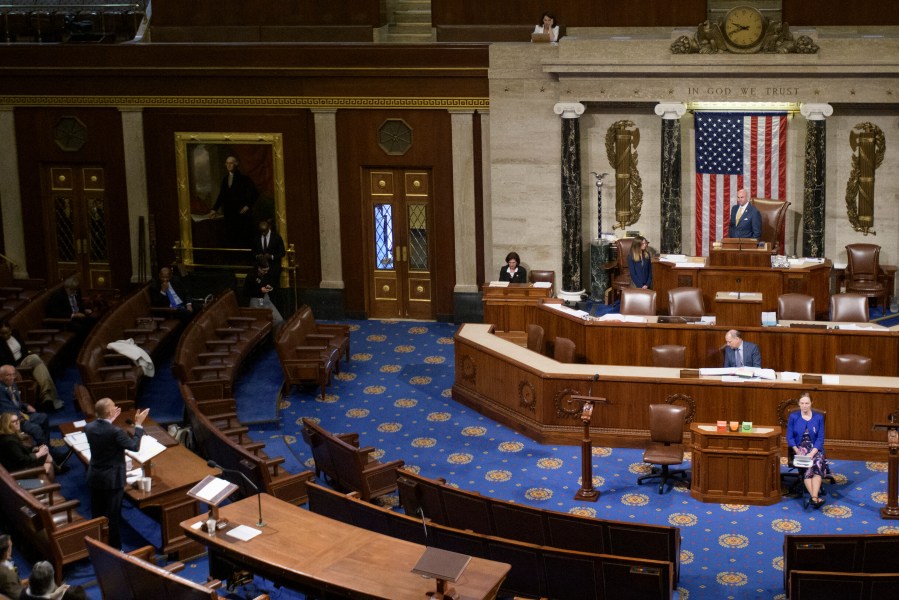
WASHINGTON (AP) — In a dramatic legislative push, Republicans successfully navigated President Donald Trump’s extensive tax and spending cut bill through the House on Thursday, meeting the GOP’s self-imposed deadline of July 4th for its delivery to the President’s desk. Spanning nearly 900 pages, the bill is a comprehensive amalgamation of tax breaks, spending cuts, and other Republican priorities, including significant allocations for national defense and deportation initiatives. Despite unified opposition from Democrats, the bill passed the Senate with Vice President JD Vance casting the decisive tiebreaking vote, and cleared the House with a narrow 218-214 margin.
The bill’s passage signals a significant legislative victory for Republicans, who have emphasized its necessity to prevent a looming tax increase following the expiration of tax breaks from Trump’s first term. The legislation enshrines approximately $4.5 trillion in tax cuts, making permanent the tax rates and brackets established during Trump’s initial presidency.
Key Provisions of the Tax Bill
Tax Cuts and Economic Impact
Central to the bill are the tax cuts, which Republicans argue are essential to forestall a massive tax hike slated for December. The legislation not only solidifies existing tax structures but introduces new deductions, such as those for tips, overtime, and auto loans. A notable inclusion is a $6,000 deduction for older adults earning up to $75,000 annually, aligning with Trump’s vow to eliminate taxes on Social Security benefits. Additionally, the child tax credit sees a modest increase from $2,000 to $2,200, though many low-income families will not benefit fully.
The bill also addresses the contentious state and local tax (SALT) deduction cap, increasing it to $40,000 for five years, a move particularly significant for high-tax states like New York. Business-related tax cuts are extensive, allowing immediate write-offs for equipment and research costs, which proponents claim will spur economic growth.
The wealthiest households stand to gain an additional $12,000 annually, while the poorest could face a $1,600 yearly loss, primarily due to cuts in Medicaid and food aid, according to the Congressional Budget Office.
Defense and Immigration Funding
The legislation allocates approximately $350 billion towards Trump’s border and national security agenda, including funding for the U.S.-Mexico border wall and expanding migrant detention facilities. The bill aims to bolster immigration enforcement by hiring 10,000 new Immigration and Customs Enforcement officers, offering $10,000 signing bonuses, and increasing Border Patrol personnel. The ambitious goal is to facilitate the deportation of up to 1 million individuals annually.
For defense, the bill provides billions for military enhancements, including shipbuilding and munitions systems, and earmarks $25 billion for the Golden Dome missile defense system. Additionally, the Defense Department receives $1 billion for border security initiatives.
Funding Cuts and Social Program Adjustments
To offset the bill’s tax cuts and new spending, Republicans propose significant reductions in Medicaid and food assistance programs. The bill introduces new work requirements for many Medicaid and SNAP recipients, mandating 80 hours of work per month for adults up to age 65. Parents of children aged 14 and older must also meet these requirements.
The Congressional Budget Office projects that 11.8 million more Americans could become uninsured by 2034 if the bill becomes law, with an additional 3 million losing SNAP benefits.
States are expected to shoulder more of the SNAP benefit costs starting in 2028 if their payment error rates exceed 6%. This provision faced pushback, particularly from Alaska, which has the highest error rate at nearly 25%, prompting an exception secured by Sen. Lisa Murkowski.
Environmental and Additional Provisions
Impact on Clean Energy
The bill proposes to roll back tax incentives for renewable energy projects, a move criticized by Democrats as detrimental to the wind and solar industries. The expiration of tax credits for electric vehicle purchases is also accelerated, ending in September 2023 instead of 2032.
Conversely, the bill expands tax credits for critical materials, including metallurgical coal, signaling a shift in energy policy priorities.
Additional Legislative Measures
Other provisions reflect broader Republican goals, such as the creation of “Trump Accounts,” a children’s savings program, and funding for the “National Garden of American Heroes.” The bill also introduces a new tax on university endowments and remittances, while eliminating a $200 tax on gun silencers and certain firearms.
Notably, the bill temporarily halts Medicaid payments to family planning providers offering abortions and expands compensation for those affected by nuclear testing. It also includes funding for NASA’s Artemis moon mission and pandemic response measures.
Fiscal Implications and Political Reactions
The Congressional Budget Office estimates the bill will increase federal deficits by nearly $3.3 trillion from 2025 to 2034. However, Senate Republicans argue that by excluding existing tax breaks from new cost calculations, the bill could potentially reduce deficits by half a trillion dollars over the next decade.
Critics, including the Committee for a Responsible Federal Budget, describe this accounting approach as an “accounting gimmick,” warning of its potential to obscure the true fiscal impact.
As the bill awaits President Trump’s signature, its passage marks a pivotal moment in U.S. legislative history, with significant implications for tax policy, social programs, and national priorities in the years to come.





